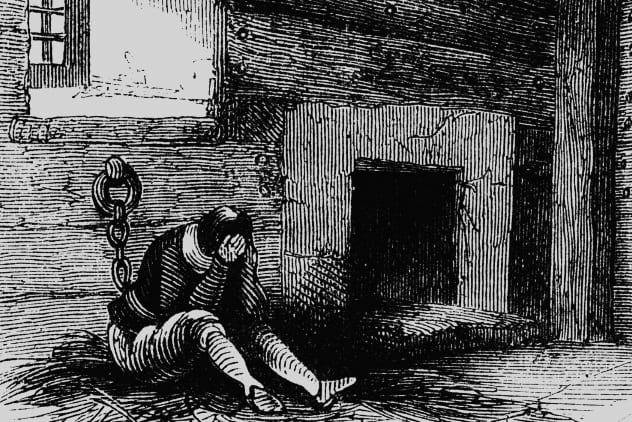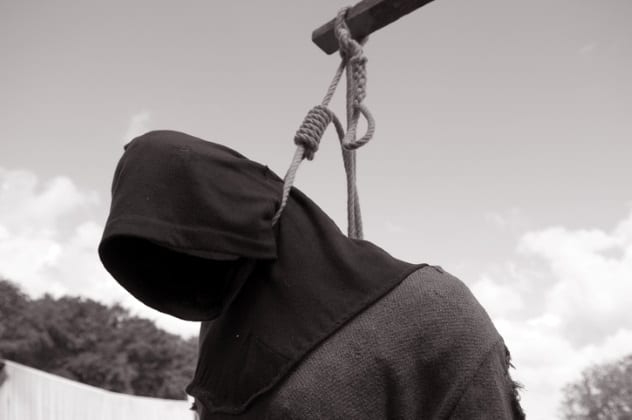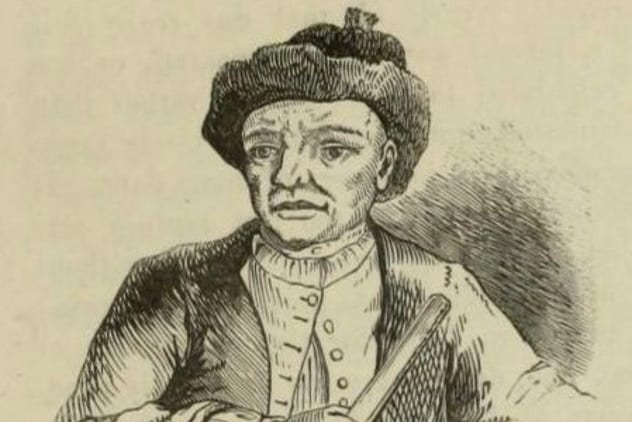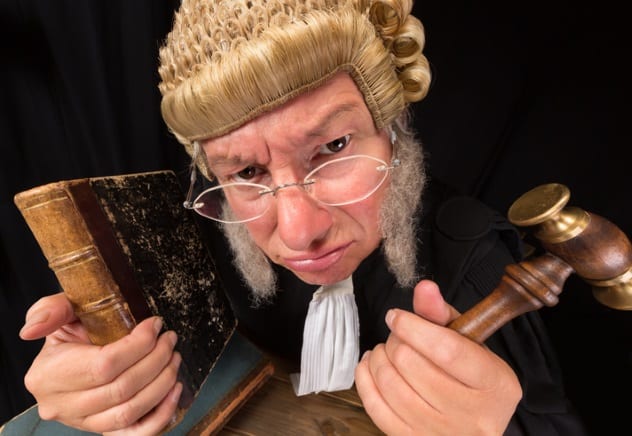 Movies and TV
Movies and TV  Movies and TV
Movies and TV  History
History 10 Wars That Sound Made Up (but Absolutely Happened)
 Movies and TV
Movies and TV 10 Movie Adaptations That Ruined Everything for Some Fans
 History
History 10 Dirty Government Secrets Revealed by Declassified Files
 Weird Stuff
Weird Stuff 10 Wacky Conspiracy Theories You Will Need to Sit Down For
 Movies and TV
Movies and TV 10 Weird Ways That TV Shows Were Censored
 Our World
Our World 10 Places with Geological Features That Shouldn’t Exist
 Crime
Crime 10 Dark Details of the “Bodies in the Barrels” Murders
 Animals
Animals The Animal Kingdom’s 10 Greatest Dance Moves
 Movies and TV
Movies and TV 10 Box Office Bombs That We Should Have Predicted in 2025
 Movies and TV
Movies and TV 10 Movie Franchises That Started Dark but Turned Surprisingly Soft
 History
History 10 Wars That Sound Made Up (but Absolutely Happened)
 Movies and TV
Movies and TV 10 Movie Adaptations That Ruined Everything for Some Fans
Who's Behind Listverse?

Jamie Frater
Head Editor
Jamie founded Listverse due to an insatiable desire to share fascinating, obscure, and bizarre facts. He has been a guest speaker on numerous national radio and television stations and is a five time published author.
More About Us History
History 10 Dirty Government Secrets Revealed by Declassified Files
 Weird Stuff
Weird Stuff 10 Wacky Conspiracy Theories You Will Need to Sit Down For
 Movies and TV
Movies and TV 10 Weird Ways That TV Shows Were Censored
 Our World
Our World 10 Places with Geological Features That Shouldn’t Exist
 Crime
Crime 10 Dark Details of the “Bodies in the Barrels” Murders
 Animals
Animals The Animal Kingdom’s 10 Greatest Dance Moves
 Movies and TV
Movies and TV 10 Box Office Bombs That We Should Have Predicted in 2025
10 Startling Facts About Crime And Punishment In English History
What do you do if you’re the victim of a crime? In the 21st century, you call the police. They go out and arrest the criminal, and an impartial justice system deals with him from there. You can go about your life, secure in the knowledge that the law makes sense, and everyone can expect to be treated fairly. Or that’s the idea, anyway.
In England before the 19th century, that was not the way that things worked. From a modern perspective, everything looks backward and upside down. For starters, you didn’t call the sheriff when a crime was committed. The sheriff called you.
10 You Had To Arrest Criminals Yourself

There were no police officers in Anglo-Saxon England, or if you look at it another way, every able-bodied male between the ages of 15 and 60 was a police officer.[1] If you saw a crime committed in your neighborhood, it was your job to “raise the hue and cry.” This literally meant shouting something like, “Stop, thief!” or “Murder!” at the top of your lungs. Doing so let your neighbors know it was time to jump into action. All of you had to work together to catch the criminal and bring him to court.
Every man was required to keep weapons at his house just for events like this. The more important a man was, the more expensive weapons he had to keep. Knights needed a chain mail shirt, an iron helmet, a sword, a knife, and a horse. The poorest people had to make do with a bow and arrows. If your arrest attempt failed, and the criminal got away, you and your neighbors had to pay a fine. This sounds unfair to us, but the Anglo-Saxons had a very strong sense of community responsibility. If one person broke the law, that meant the whole community had failed. It was everyone’s job to make sure that justice was restored.
9 You Had To Pay To Be In Jail

In modern times, the money spent to feed and house prisoners comes out of our taxes. This wasn’t true in the past. Back then, prisoners paid for their own upkeep. It didn’t matter if they were eventually found innocent—they still had to pay. Prisons could be a profitable business for the officials who ran them. The warden, or “keeper,” of Newgate Prison paid up to £5,000 to the government for the privilege of running the prison. He recovered his investment by making prisoners pay a fee when they entered Newgate and another one before they could leave.
Inmates paid to have leg irons put on and taken off. They paid for candles, soap, and bedding. If they died in the prison, their relatives had to pay a fee to get their bodies back.[2] Prisoners also had to pay money to the other inmates. When new prisoners entered, the criminals who’d been there a while would tell them, “Pay or strip.” If the newcomers had no cash to hand over, they were forced to give up some of their clothing, which would then be sold. This system was particularly cruel to debtors, who were in prison precisely because they had no money.
8 You Could Be Executed For Practically Anything

This wasn’t originally the case in England. In 1688, only 50 crimes carried the death penalty. By 1815, the number had swollen to 288. Crimes you could be hanged for included stealing something worth more than five shillings (about $40 today), stealing from a rabbit warren, impersonating a pensioner, cutting down a young tree, damaging Westminster Bridge, and hunting while in disguise. The laws were so harsh that juries sometimes refused to convict defendants who were obviously guilty. Jurors didn’t want to see people executed over minor crimes, so they just set them free.
Most of the new capital crimes added during the 17th and 18th centuries were for theft. During that time, many people left farms in the country for London and other cities. The newcomers were looking for work, but they often didn’t find it. There was a growing number of very poor people in the cities. At the same time, new inventions in manufacturing were making a small number of people very rich. The rich citizens feared “the mob” of the poor and pushed for harsher and harsher punishments for those who stole.[3]
7 The Criminal Code Often Made No Sense

Preindustrial English law operated by making terrifying examples of a small number of criminals. The hope was that people would remember these rare but frightening punishments and be too afraid to commit crimes.
This helps explain why it was a minor offense to pick fruit from someone else’s fruit trees but a capital crime to steal fruit that had already been picked. You could be executed for breaking a window to rob someone’s house if you did it after dark, but if you waited until after sunrise, breaking and entering was only a misdemeanor. Pickpocketing carried the death penalty, but kidnapping a child did not.
Historian Frank McLynn summed the situation up nicely: “The criminal Code was unjust, irrational, and exceptionally severe.”[4]
6 You Could Pay A Thief To Catch Another Thief

England had no professional police force until 1829. Before that, laypeople took turns acting as constables in their neighborhoods. The constable’s job was to chase and catch lawbreakers, not to investigate crimes. So what could you do if you didn’t know who had stolen your property? And how could you get that property back? One thing you could do was hire a kind of combination private detective and bounty hunter called a thief-taker. Thief-takers used their contacts in the underworld to find out who had your stolen goods. For the right price, they’d haul the thief in front of the sheriff and bring you your things back.
Some thief-takers were legitimate and performed a valuable service. However, it won’t come as a surprise that not everybody with extensive contacts in the underworld was honest. Some thief-takers operated on both sides of the law, taking citizens’ reward money on one hand and then demanding protection money from criminals on the other. Others convinced gullible people to commit crimes, only to turn around and arrest them in exchange for payment.[5]
The most famous of the thief-takers was Jonathan Wild, the self-styled “Thief-Taker General.” At one time hailed as a crime-fighting hero, Wild was secretly “finding” goods that he himself had stolen. At the height of his career, he was both a London gang leader and an anti-crime consultant to the British government. Unsurprisingly, Wild’s advice to the Privy Council was that they should offer higher rewards to thief-takers. Wild was betrayed to the authorities by some members of his gang and executed in 1725. He was the inspiration for the character of Peachum in The Beggar’s Opera by John Gay.
5 You Could Have A Great Time At An Execution

If the public was frightened into submission by the spectacle of public executions, then no one seems to have told the execution-goers. In London in the 18th century, hanging days were holidays. Up to 200,000 people took the day off from work and lined the 5-kilometer (3 mi) path from Newgate Prison to the hanging scaffold at Tyburn.[6] The event was supposed to be a kind of morality play, in which the deaths of criminals inspired people to be obedient to church and civil authorities.
The criminals themselves seldom acted the part of remorseful penitents, though. It was common to curse the courts and witnesses for the prosecution. Some people dressed in their finest clothes and behaved as if they were at a party in their own honor. Some were so drunk on the alcohol that sympathetic spectators gave them that they barely seemed to know what was going on.
Many of the spectators were drunk, too. They drank gin and ate snacks sold by enterprising peddlers. They bought good seats in public viewing stands and copies of what were supposed to be the dying speeches of the condemned. They threw things at unpopular prisoners and cheered the popular ones, especially those who faced death with courage and panache. Executions were so popular that they were written up as a tourist attraction in the 1740 Foreigner’s Guide To London.
4 You Could Be Jailed For The Rest Of Your Life For Owing Money

Being unable to pay your debts was a civil offense in England, but you could still end up in prison because of it. If someone sued you for the nonpayment of a debt, the court could order you to be jailed until the debt was paid. But if you couldn’t pay a debt while you were still working at your job, how were you going to pay it from inside a prison cell? Things got worse for you every day you spent in jail, because you had to pay the jailer for your upkeep while you were imprisoned. With each day that went by, you owed more money.[7]
Debtors in prison had different strategies for paying their way out. Some got money from their families and friends; others found ways to work in prison. Some were able to renegotiate the terms of their debt with their creditors. And some just died in prison.
In 18th-century London, the poorest of the poor often ended up in the “common side” of Marshalsea prison. (Those who had more money could pay to stay in the more comfortable master’s side.) The prison officials weren’t required to provide food, so they didn’t. Charitable donations provided the only food poor prisoners got, and that wasn’t much. Inmates who got on the jailers’ bad side were sometimes beaten with clubs, tortured with heavy chains attached to their legs, or forced to stay in rooms where people were dying of smallpox. Deaths were very common.
If you didn’t die in debtor’s prison, you might have to stay there a long time. When London’s Fleet Prison finally closed, two of its debtors had been locked up for 30 years. Most people who went to debtor’s prison owed large sums of money, sometimes many times what they earned in a year. That wasn’t true of everyone, though. In one London prison in 1789, about a third of the debtors owed less than £20, which would be an amount up to $30,000–$40,000 today.
3 You Could Be Arrested For Wandering Around While Poor

This had to do with how charity was distributed. A parish was a subdivision of a county and the basic unit of English government. Parishes charged a form of property tax called rates from all the local house owners. Part of the rate money went to help support poor people who lived in the parish. For the most part, citizens were fine with supporting their poor neighbors, but they didn’t want to have to look after the poor of other parishes. For that reason, poor people were discouraged from traveling. “Persons wandering abroad and begging” were labeled vagrants or vagabonds and could be subjected to punishments ranging from being put in the stocks to two years of slavery.
In 1695, two men named Peter Lawman and Francis Buckley were actually sentenced to death for vagabonding. Buckley was found with a pistol, which could have been part of the reason the sentence was so severe. There was virtually no practical difference between “vagabonds” and simple poor people, except that vagabonds were more likely to be strangers to the neighborhood.[8]
The 1744 Vagrancy Act contained a long list of who was considered undesirable, including all kinds of travelers who had no steady employment. Some examples of prohibited people were “common players of interludes,” unlicensed peddlers, “persons pretending to be Gypsies,” and vaguest of all, “All persons wandering abroad and lodging in alehouses, barns, outhouses or in the open air, not giving a good account of themselves.” Essentially anyone without resources in the form of money or connections could be prosecuted as a vagrant, especially if they wandered far from home.
2 It Was Alarmingly Easy To Be Charged With Piracy

According to the Piracy Act of 1698, it was a crime to “receive, entertaine, or conceale” a pirate or to accept any of his stolen goods.[9] Accessories to piracy could be punished with death.
This is precisely what happened to six Englishmen who had the misfortune of boarding Calico Jack Rackham’s ship in 1720. Their day started with them in a canoe looking for turtles. Then Rackham’s crew invited them on board to share a bowl of punch, and a few hours later, they were at anchor and drunk. While the pirates and their guests were indisposed, pirate-hunter Jonathan Barnet slipped up on them and captured the lot. Three months later, the punch-drinkers were on trial for their lives. They were condemned to death based on the facts that they were found armed and had helped Rackham row his ship. They were executed in February 1721. Likewise, in 1722, four men were hanged for being seen drinking and carousing with “Black Bart” Roberts’s crew.
The obvious moral of this story is to never drink with pirates, or if you must drink with pirates, don’t let anybody catch you. Essentially any felony committed on or in a body of water could count as piracy, and that fact sometimes resulted in surprisingly mundane “piracy” convictions. In 1768, a man named George Geery was executed for piracy after boarding a Dutch ship, assaulting one of its officers, and stealing several of his hats. The broad definition of piracy was still on the books in 1848, when several men were tried for piracy for trying to mutiny aboard a steamship. The cause of the mutiny? An argument over whether one particular sailor could bring his chickens aboard. All of the men were acquitted.
1 There Was No Real Equal Protection Of The Law

The whole legal system was stacked in favor of the rich and against the poor. You can see this in the way that power was distributed. Government officials got their positions one of two ways. One was patronage, in which officials were chosen for their jobs by a powerful friend, relative, or person who owed them a favor. The other was the sale of offices. Sometimes, men with money but no powerful friends bought their jobs. These jobs were then treated as private property, much like owning a piece of land. Those who paid for their offices charged for their services as a means of making back the money they’d invested.[10] This was not considered corruption; it was just thought of as business as usual.
Judgeships were appointed offices that didn’t pay. Even if a poor person was offered the job of judge, they couldn’t have afforded to work for free. Likewise, you had to be a man of property to sit on a jury. If you had no money and didn’t know anyone who did, you stood virtually no chance of becoming an important decision-maker. You stood no chance at all if you happened to be a woman. Only men were allowed to have power in the realm of government and the law.
If a wealthy and important citizen was accused of a crime, it was often difficult to find witnesses for the prosecution. Nobody wanted to get on the bad side of a powerful person. On the other hand, defense witnesses could always be found, for a price. In the unlikely event that someone with a lot of money was arrested, the practice of allowing people to bring to prison the most luxurious comforts they could afford ensured that the accused didn’t suffer too much. The poor had no such advantages. Instead, they were imprisoned, fined, executed, and transported to prison colonies at far higher rates than their wealthy neighbors.
Ben Eggertsen is a freelance writer, former special education teacher, and amateur historian. He lives in Ypsilanti, Michigan.
Read more about crime and punishment through history on 10 Punishments Of The Royal Navy During The Age Of Sail and 10 Ancient Persian Punishments Beyond Your Worst Nightmares.








